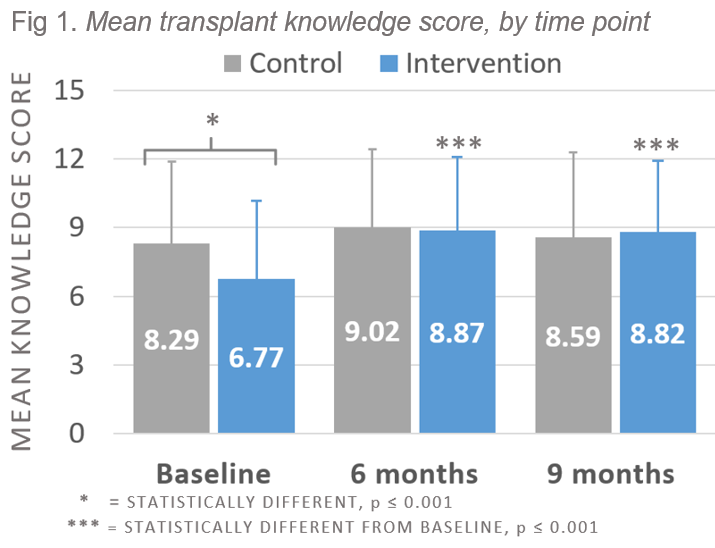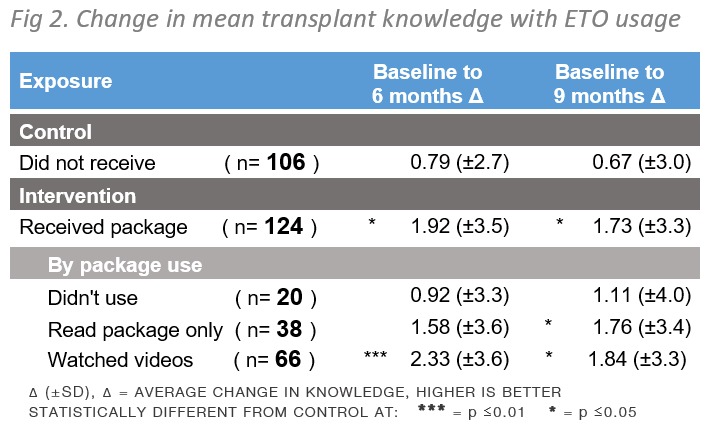Kidney Transplant Education using the Explore Transplant Ontario Package: Increasing Transplant Knowledge in Patients on Maintenance Dialysis and Addressing Ethnic Disparities in Transplant Education
Dmitri Belenko1, Candice Richardson 1, Vardaan Gupta1, Evan Tang1, Nathaniel Edwards1, Marta Novak 2, John Devin Peipert3, Amy Waterman 3, Istvan Mucsi1.
1Multi-Organ Transplant Program, Toronto General Hospital, Toronto, ON, Canada; 2Department of Psychiatry , Toronto General Hospital, Toronto, ON, Canada; 3David Geffen School of Medicine , UCLA, Los Angeles , CA, United States
Introduction: Improving transplant education for patients with end stage kidney disease (ESKD) may improve their access to kidney transplantation (KT). Non-Caucasian patients with ESKD are less likely to receive KT compared to Caucasian patients, and may benefit more from such interventions. Explore Transplant Ontario (ETO) is a KT education tool, utilizing informational brochures alongside patient and living donor testimonial videos to motivate patients and potential donors to consider KT and donation. In a pilot study, we assessed the impact of ETO use on KT knowledge, and investigated ethnical disparities between groups.
Materials and Methods: In this non-randomized, parallel arm controlled study, 230 in-centre dialysis patients were recruited from two hospital units. Patients in the intervention arm (n=124) received ETO packages and regular follow-up to address KT-related questions; control group received education as usual. Patients across both sites completed questionnaires at baseline, 6 and 9 months afterwards, with interim follow-up visits. KT knowledge was assessed with a 19-item true/false & multiple-choice questionnaire, scored 0-19, with higher scores indicating higher KT knowledge.
Results and Discussion: Compared to the control group, patients in the intervention group were significantly older (mean age = 63 [±10] vs 55 [±14], p<0.001), more likely African Canadian, and less likely to have completed Grade 12. Baseline knowledge scores were different, with a higher score for control group (mean [SD] = 8.21 [3.7] vs 6.77 [3.4]). In the intervention arm, 66 patients watched the videos and/or read the brochures, while 58 patients only read the brochures or didn't use the package at all.
Knowledge scores increased at 6- and 9-month follow-up for both groups, with significantly higher increase for the intervention group compared to control (mean increase at 6 months [SD] =1.92 [2.7] vs 0.79 [2.7], p=0.01; at 9 months=1.73 [3.3] vs 0.67 [3.0], p=0.04). The follow-up knowledge score was higher in those who watched the videos in addition to reading, compared to those who only used the package partially (mean score [SD] at 6 months = 9.5 [3.0] vs 8.1 [3.4], p=0.03; at 9 months =9.4 [3.1] vs 7.9 [2.9], p=0.04). Baseline knowledge scores tended to be lower for non-Caucasians within the study population (mean [SD] scores for Caucasians=8.26[4.0], Asians=7.6[3.6], Blacks=7.1[3.4], p=0.14). At study end, the change in knowledge score was not different between ethnic groups (mean increase [SD]: Caucasians=1.7[3.7], Asians=1.4[3.3], Blacks=1.7[3.2], p=0.907).
Conclusion: Transplant education using the ETO program lead to significantly higher increase in KT knowledge compared to care as usual. Non-Caucasian patients may be at risk for lower transplant baseline KT knowledge, and may benefit from more culturally tailored educational interventions. Watching the videos appears to confer the greatest educational benefit. Further research is needed to assess the impact of ETO use on KT rates, and to develop tailored interventions to address ethnic disparities.


